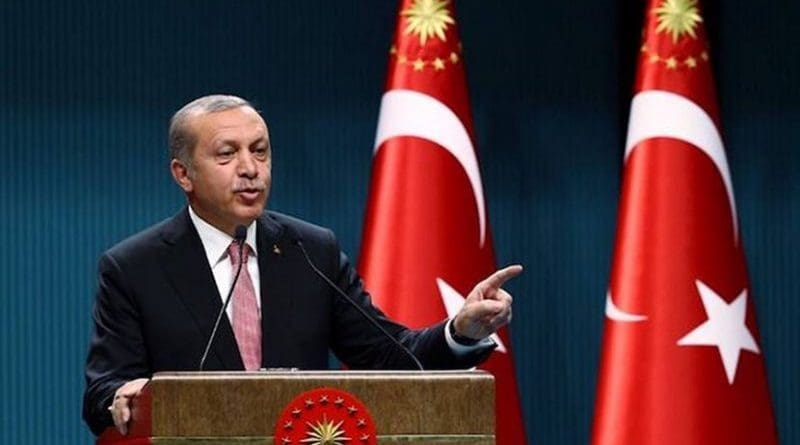Erdogan Wants The World Stage, From The Kurds To Kashmir – Analysis
By Observer Research Foundation
By Kabir Taneja
The United States (US) President Donald Trump unexpectedly announced that he was revoking the support being provided to the Syrian Kurds, who operated under the Syrian Defense Force (SDF) umbrella, to fight and defeat ISIS on the ground in Syria, leaving the minority group to fend for itself. Instead, the US would hand over its policy on Syria to President Recep Tayyip Erdogan of Turkey in an unplanned, brash and irresponsible manner. Within hours, the Turkish military started to attack Kurdish positions, the same people who sacrificed more than 11,000 of their own over the past five years to defeat the so-called Islamic State.
For Turkey, almost the entirety of the Kurdish population in the region is seen from the lens of the PKK, a far-left militant outfit, designated as a “terror” group by Ankara. The rise of Kurdish nationalism, and the ethnic group’s aims to set-up a Kurdish sovereign State carved out of the current borders of the Middle East, is an unacceptable proposition for Turkey. Despite having a significant minority Kurdish population at home, Erdogan’s primary national security approach has always been to undermine the Kurds as part of Turkey’s broader national interest in the region.
Prior to Trump’s decision to withdraw, the US and Turkey were already at loggerheads. Ankara had decided to go ahead and purchase of S-400 missile defence systems from Russia, a cardinal sin for a North Atlantic Treaty Organization (NATO) member. In response, the Trump administration blocked the deliveries of F-35 fighter jets. Turkey is also home to more than 3 million refugees, which the State uses as bait to gain leverage with both Europe and the US.
However, the start of Turkish military actions on the Kurds is not just about a narrowed down regional aim of national security, but perhaps more importantly, how Erdogan sees Turkey on the world stage. Prior to the Trump announcement, Turkey already had an expansive policy for the conflict in Syria, specifically the northeastern parts of the country. The rise of the so-called Islamic State from 2014 onwards was an event that not only united regional and international actors to defeat them, but other Islamist and militant groups in the region as well.
Turkey, over the past two years, has dealt with the likes of the Hayat Tahrir al-Sham (HTS), an Islamist group carved out of the erstwhile Jabhat al-Nusra, with on-and-off ties with Al-Qaeda. Previously, HTS has allowed Turkish military to conduct patrols in the north Syrian territory it has controlled, and offered protection to Turkish military observation points as well.
Amid all this is a vision that Erdogan wishes to see succeed — of Turkey rising as the major power centre in the Muslim world. While this thought-process existed for a long time, the 2016 failed coup against him fastened the process of him consolidating power. The Erdogan plan, which many see as his vision of a rejuvenated “neo-Ottoman” power, re-imagining the historical glory of the erstwhile Ottoman Empire, also sees Turkey as the power centre for Sunni Islam. This vision challenges the centrality of Saudi Arabia in the Middle East, which was visible in the aftermath of the murder of journalist Jamal Khashoggi, killed in the Saudi consulate in Istanbul in October 2018 as Turkey systematically leaked the case-related information against Saudi heir-apparent Mohammed Bin Salman and the House of Saud. For Erdogan, Turkey is the Islamic power awaiting its due, and while it does not have the oil dollars backing its fragile economy, it is still working hard to create its own narratives and influence zones across the region.
Erdogan has not stopped in just the Middle East; the president wants the world to view it as the Islamic power that stands up for Muslims. At the UN General Assembly (UNGA) this year, he brought up the issue of Kashmir, massaging the requirements of its close relations with Pakistan post the abrogation of Article 370 by India. While the likes of Saudi and United Arab Emirates walked the neutral-line over India’s moves in Kashmir, Erdogan saw an opportunity to both undermine Riyadh and Abu Dhabi not just regionally but on an international scale. Make no mistake; the UNGA garb was more about Middle East politics than Kashmir.
India’s response to Turkey’s stand and Indian interests has been consistent. Prior to UNGA, Prime Minister Narendra Modi met with leaders of Cyprus and Armenia, two states that have heavy historical contentions with Ankara. New Delhi also released an uncharacteristically direct statement criticising the military assault in the northern Syria, stating Turkey’s actions can undermine stability in the region and the fight against terrorism. India’s language mirrored that of Erdogan’s on Kashmir, sending a subtle yet straightforward statement to Turkey.
This article originally appeared in Hindustan Times.


Erdogan is a tin pot dictator with outsize ambitions. His party’s defeat in 2 Istanbul elections is a reminder that his hold in Turkey is tenuous. Democratic forces in Turkey are alive and well.